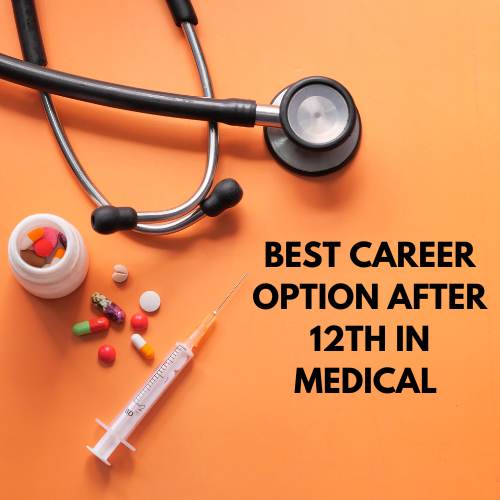Last Updated on 2 years by studentliveinfo
Table of Contents
Best Career Options After 12th in Medical in 2023
Students often find it difficult to choose a solid professional path after completing their 12th-grade education. It is important that the chosen profession not only appeal to their interests but also provide a comfortable living for them.
Students have the option of completing their secondary education in one of three distinct tracks—namely, science, commerce, or the humanities—depending on which professional domains most pique their interest.
However, it is vital that they conduct an in-depth study on the various job alternatives that are open to them after they have completed their 12th-grade education in their respective fields and that are also aligned with their preferences.

There are several career options in the medical field that you can pursue after completing 12th grade. The best career option after 12th in the Medical field involves:
-
Bachelor of Medicine and Bachelor of Surgery (MBBS): This is a professional degree in medicine that you can pursue after completing 12th grade with science subjects. After completing an MBBS degree, you can practice as a medical doctor and work in hospitals, clinics, and other healthcare settings.
-
Bachelor of Dental Surgery (BDS): If you are interested in pursuing a career in dentistry, you can consider completing a BDS degree. This degree program will prepare you to practice as a dental surgeon and work in dental clinics, hospitals, and other healthcare settings.
-
Bachelor of Science in Nursing (BSc Nursing): If you are interested in pursuing a career as a nurse, you can consider completing a BSc Nursing degree. This degree program will prepare you to work as a registered nurse in hospitals, clinics, and other healthcare settings.
-
Bachelor of Ayurveda, Medicine, and Surgery (BAMS): If you are interested in pursuing a career in alternative medicine, you can consider completing a BAMS degree. This degree program will prepare you to practice as an Ayurvedic doctor and work in hospitals, clinics, and other healthcare settings.
-
Bachelor of Homeopathic Medicine and Surgery (BHMS): If you are interested in pursuing a career in homeopathy, you can consider completing a BHMS degree. This degree program will prepare you to practice as a homeopathic doctor and work in hospitals, clinics, and other healthcare settings.
-
Bachelor of Veterinary Science and Animal Husbandry (BVSc and AH): If you are interested in pursuing a career in veterinary science, you can consider completing a BVSc and AH degree. This degree program will prepare you to work as a veterinarian and treat animals in hospitals, clinics, and other healthcare settings.
Career Opportunities in Medical Domain
There are several best career options after 12th has various opportunities in the medical field that you can pursue after completing 12th grade. Some of the options include:
-
Medical Doctor: After completing an MBBS degree, you can practice as a medical doctor and work in hospitals, clinics, and other healthcare settings. You can specialize in a particular area of medicine, such as surgery, pediatrics, or obstetrics and gynecology, by completing a postgraduate degree in that specialty.
-
Dentist: After completing a BDS degree, you can work as a dental surgeon and treat patients in dental clinics, hospitals, and other healthcare settings. You can also specialize in a particular area of dentistry, such as orthodontics, oral surgery, or periodontics, by completing a postgraduate degree in that specialty.
-
Nurse: After completing a BSc Nursing degree, you can work as a registered nurse in hospitals, clinics, and other healthcare settings. You can also specialize in a particular area of nursing, such as critical care, pediatrics, or gerontology, by completing a postgraduate degree in that specialty.
-
Ayurvedic Doctor: After completing a BAMS degree, you can practice as an Ayurvedic doctor and work in hospitals, clinics, and other healthcare settings. Ayurvedic medicine is a system of traditional medicine native to India that uses herbs, diet, and other natural therapies to treat various health conditions.
-
Homeopathic Doctor: After completing a BHMS degree, you can practice as a homeopathic doctor and work in hospitals, clinics, and other healthcare settings. Homeopathy is a system of alternative medicine that uses highly diluted substances to treat various health conditions.
-
Veterinarian: After completing a BVSc and AH degree, you can work as a veterinarian and treat animals in hospitals, clinics, and other healthcare settings. You can also specialize in a particular area of veterinary medicine, such as surgery, internal medicine, or pathology, by completing a postgraduate degree in that specialty.
New Best Career Options After 12th in Medical
Beside traditional medical courses there are several best career options after 12th in medical domain includes:
Clinical Research Scientist
Scientists working in clinical research are interested in figuring out how to provide healthcare services in the most effective manner. They investigate diseases and disorders through research and experiments in order to discover accurate diagnoses and appropriate therapies for those diseases and ailments. Because of this, it is a field that places a significant emphasis on research; hence, you should only go into it if you are willing to spend the rest of your life working in laboratories.
Education: You are required to earn a Bachelor of Science degree in the area of study that most interests you, such as Botany, Zoology, Chemistry, Biochemistry, Biotechnology, Microbiology, Genetics, Nursing, M.B.B.S / B.D.S / B.A.M.S / B.H.M.S / B.V.Sc etc., among other options. After you have completed your Bachelor’s degree, you can apply to one of the many universities that offer Master of Science degrees in clinical research.
Opportunities in the Workplace: You have the option of working in a variety of fields, including preventive care, treatment, diagnosis, and others. They are employed in a wide array of workplaces, such as medical facilities, academic institutions, and pharmaceutical research facilities.
Indian Institute of Clinical Research, Asian Institute of Health Sciences, and ICBio Clinical Research are the names of some of the colleges that students might attend.
Radiology Technician
Imaging techniques, such as x-rays, computed tomography (CT), magnetic resonance imaging (MRI), ultrasound, and other similar methods, are utilized by radiology technicians in order to identify various injuries, illnesses, and other conditions.
Education: A bachelor’s degree in radiography, often known as a B.S. in radiology, is typically all that is required to begin a career in this area. The M.sc. degree in radiology is typically required for professionals who wish to specialize in a particular technique. Acquiring expertise in a variety of procedures can be accomplished by working for any number of available certifications.
Opportunities in the working world: Radiologists need assistance in interpreting patient results, thus radio-technicians work alongside them and provide that assistance. They are employed in fields such as computed tomography (CT), magnetic resonance imaging (MRI), mammography (where they especially look for breast cancer), and other related fields. They spend much of their time working in medical facilities, such as hospitals or specialized labs.
Colleges include Rajiv Gandhi University of Health Sciences, Jawaharlal Nehru Institute of Post-Graduate Medical Education Research, All India Institute of Medical Science, Christian Medical College, Armed Forces Medical College, and Kasturba Medical College.
Optometry
Optometry is a branch of medicine that focuses on the diagnosis and treatment of conditions that are associated with the eyes. It is anticipated that the need for optometrists will expand significantly over the next several years as a result of the widespread use of new technologies and forms of visual media. This will make optometry a lucrative career choice.
Education: During the course of your graduation (Bachelor in Optometry (B. Opto), or Bachelor of Science (B.Sc), you will study the anatomy of the eye, the lightening of the eye, refractive errors (loss of vision), and other topics related to optometry.
Following the completion of the program, an optometrist is qualified to offer corrective solutions to patients and is an expert in identifying pathological disorders that affect the eyes.
Following the completion of your undergraduate degree, you will be expected to complete an internship at either a recognized hospital or a practicing physician in the same profession. After that, you will be able to continue your education and earn a master’s degree in optometry (either a Master of Optometry (M.Opto) or a Master of Science (M.Sc)).
Opportunities in the job market include working in shops or organizations, hospitals, or even as a consultant. You might find employment in an ophthalmic (eye) clinic, an ophthalmology or optometry department at a hospital, an optical store, the ophthalmic industry or commerce, or another related field.
Colleges include the All India Institute of Medical Sciences (AIIMS), Bharati Vidyapeeth University, Jamia Hamdard University, and the Government Medical College and Hospital. Also included is the Birla Institute of Technology and Science in Pilani.
Courses Leading to a Medical Certificate
- Medical Laboratory Assistant
- Operation Theatre Assistant
- Nursing Care Assistant (Certificate)
- ECG Assistant
- Dental Assistant
- Ophthalmic Assistant
- Dialysis Technician
- X-Ray/Radiology Assistant (or Technician)
- CT Scan Technician
- MRI Technician
Medical Entrance Exams
1. NEET
The National Eligibility and Eligibility Test, also known as NEET, is a national-level medical entrance test that is administered annually by the National Testing Agency (NTA) for a variety of programs, including MBBA, Ayurveda, BDS, and Homeopathy. The entrance examination consists of one hundred eighty multiple-choice questions that cover topics in biology, chemistry, and physics. The examination is given twice a year, and it lasts for a total of three hours each time.
2. AIIMS
Aspirants who have completed their 10+2 education and are interested in enrolling in an MBBS program are required to take an entrance exam that is administered by AIIMS. The fact that AIIMS intends to offer only fifty places to the applicants would make the competition more difficult. The course curriculum covers topics such as physics, biology, and chemistry, in addition to general knowledge, logical thinking, and aptitude. The AIIMS administers the test on two separate occasions per year. Courses in Medicine Following the 12th Grade.
3. JIPMER
The Jawaharlal Institute of Postgraduate Medical Education and Research administers the JIPMER Entrance test on an annual basis to choose applicants for medical programs for students who have completed their 10+2 education. There are a variety of topics covered on the JIPMER exam, including chemistry, biology, physics, the English language, and understanding. There are a total of 200 questions on the exam.



0 Comments